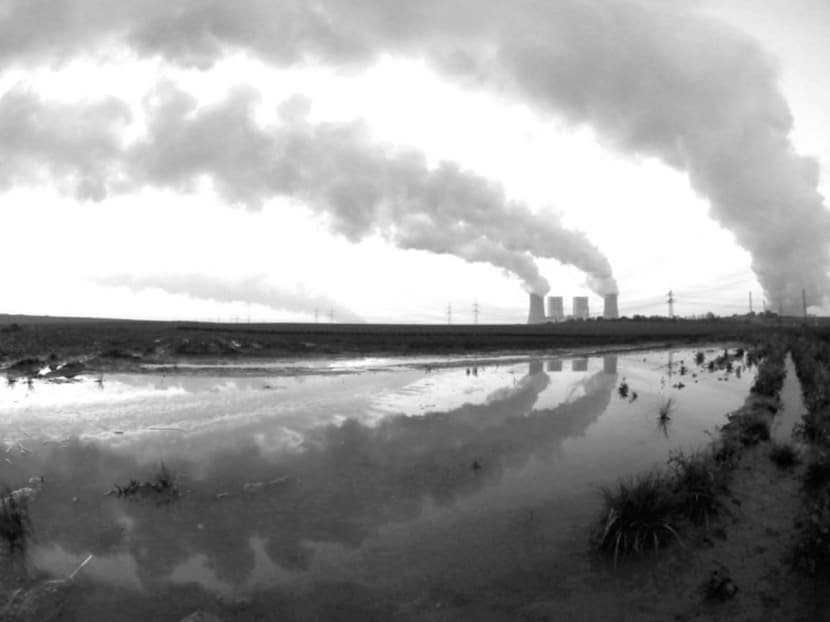Humans may be getting to grips with global warming
Perhaps I should cross my fingers before writing this, but it just may be that we have slipped, virtually without noticing, past a landmark in environmental and industrial history. Preliminary figures suggest that last year, for the first time, global emissions of carbon dioxide from burning fossil fuels failed to rise despite economic growth. Even more surprisingly, emissions seem to have fallen in China.

A coal power plant in Neurath, Germany, in 2013. The growth of coal-fired electricity, which tripled between 2005 and 2012, has gone abruptly into reverse. Photo: Reuters
Perhaps I should cross my fingers before writing this, but it just may be that we have slipped, virtually without noticing, past a landmark in environmental and industrial history. Preliminary figures suggest that last year, for the first time, global emissions of carbon dioxide from burning fossil fuels failed to rise despite economic growth. Even more surprisingly, emissions seem to have fallen in China.
If confirmed, these developments — only recently thought beyond the bounds of practical possibility — would provide the most hopeful sign yet that the world may get to grips with climate change before it becomes too dangerous. They indicate that the traditional link between carbon emissions and economic growth can be broken.
Two weeks ago, the International Energy Agency provisionally reported that global emissions were 32.3 billion tonnes in 2014, the same as the year before. These have failed to rise only three times before in the past 40 years, on each occasion because of bad economic times. In the early 1980s, there was a United States recession; in 1992, the Soviet Union had just collapsed; in 2009, there was a financial crisis. Last year, by contrast, the global economy grew by 3 per cent.
More encouraging still, new estimates suggest that Chinese emissions, a quarter of the total, dropped by 2 per cent, despite a 7.4 per cent growth in GDP.
It is hard to overstate the sense of what the agency calls “very welcome surprise”. Only weeks ago, warnings that emissions would have to peak this decade to avoid catastrophic global warming seemed impossible to satisfy. And a Chinese announcement last autumn that it would stop the pollution increasing by 2030, as part of an agreement with the US, was widely dismissed as an insincere pipe dream.
PHASING OUT COAL
Of course, one year’s measurements, even if confirmed, do not signify a trend: The likelihood must be that there will be some growth in future. But there are good grounds for believing, as the agency’s chief economist Fatih Birol puts it, that “for the first time, greenhouse gas emissions are decoupling from economic growth”.
Chief among them is the sudden plunge of coal, the dirtiest fossil fuel and biggest contributor to climate change, from boom into bust. The growth of coal-fired electricity, which tripled between 2005 and 2012, has gone abruptly into reverse. A report two weeks ago concluded that hundreds of plants have been closed or cancelled worldwide in recent years, with two abandoned for every one completed.
This trend is accelerating. Last Thursday, government sources in Germany, justly criticised for expanding coal use while phasing out nuclear power, disclosed plans to cut it by the equivalent of eight plants. And last Tuesday, Italy’s biggest power company, Enel, announced it was phasing out investments in the fuel following a decision in December by the giant German firm E.ON to switch its focus to renewables.
In the United Kingdom, Prime Minister David Cameron, leader of the opposition Ed Miliband, and Deputy Prime Minister Nick Clegg jointly pledged last month to build no more coal-fired power stations without equipment to prevent carbon emissions. Coal hardly features in the European Union’s recently announced energy plans, and in the US, the share of electricity it generates has dropped from 50 to 39 per cent in a decade.
The biggest shift has come from China, where, as I predicted in December, coal use unexpectedly fell last year after doubling over the past decade. The once-explosive increase in new plants has halved since 2006, and those that have been built are running at only 54 per cent capacity as the country cracks down on air pollution. In India, where a surge of new construction was expected to take up the slack, six projects have been shelved or scrapped for every one completed since mid-2012.
Of course, some countries, including Turkey, Vietnam, Indonesia and Poland, still play court to King Coal. Over their lifetimes, the plants that already exist will contribute 85 per cent of the carbon dioxide that can be emitted without provoking dangerous global warming. That leaves little space for oil and gas, let alone any new coal plants.
Much more has to be done to phase out this grubby fuel. Even stabilising carbon dioxide emissions will not be enough because the gas accumulates in the atmosphere. The emission reduction plans due to be agreed at a summit in Paris this December still fall far short of what we can get away with. But with new grounds for hope, I, at least, am keeping those fingers crossed. THE DAILY TELEGRAPH






